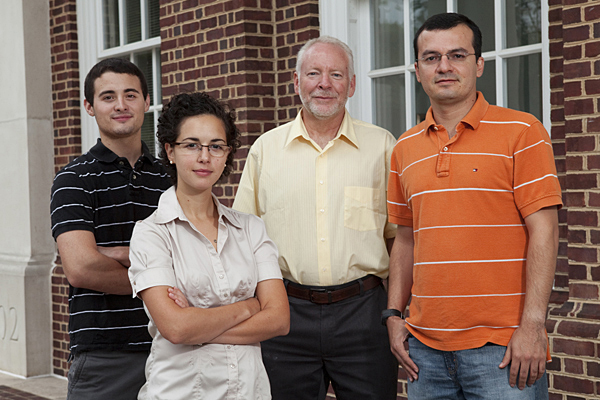
Sustainability solutions
UD wins $1 million grant to train energy efficiency experts
10:28 a.m., Sept. 21, 2011--The University of Delaware has received $1 million in funding from the U.S. Department of Energy (DOE) to continue its Industrial Assessment Center (UD-IAC), an experiential learning student program that saves area manufacturers an average of $90,000 each per year in energy efficiencies.
Through UD-IAC, graduate and undergraduate students gain practical experience in assessing small and medium sized manufacturing industries for large-scale energy saving opportunities, including energy efficiency improvements, waste reduction and pollution prevention measures, and productivity improvements.
Campus Stories
From graduates, faculty
Doctoral hooding
UD has been heavily involved in energy research for many years, with numerous faculty conducting technical and policy research in renewable energy, fuel cells, hydrogen, climate change, energy economics and the societal impacts of energy consumption. According to Keith Goossen, professor of electrical and computer engineering and director of the UD-IAC, the reality is that these resources are not coming to market quickly enough.
“Energy efficiency serves as an important bridge between society’s current fossil fuel consumption and the energy alternatives of tomorrow,” said Goossen. “We call it ‘negawatts’ – a form of alternative energy that does not produce a new energy source, but instead reduces energy demands.”
The center, which is jointly supported by the Department of Electrical and Computer Engineering and the Center for Energy and Environmental Policy (CEEP), targets companies located within 150 miles of UD’s Newark campus whose energy costs exceed $100,000 annually.
Since 2006, faculty and students involved in the program have performed 80 assessments at companies between Washington, D.C., and New York, one of the most important industrial corridors in the nation.
“This region accounts for manufacturing outputs valued at nearly $254 billion, enabling the UD-IAC’s work to have far-reaching impact,” Goossen remarked.
A typical plant assessment results in eight efficiency recommendations, three to four of which are implemented, Goossen added. The average energy savings per plant is 7,745 MMBTU, which equates to a 10-20 percent cost reduction per plant, per year – on average $90,000. (MMBTU represents one million British thermal units.)
“Energy efficiency is the cleanest method to meet our energy needs,” added John Byrne, a renowned authority on climate change and director of CEEP. “The Center for Energy and Environmental Policy is pleased to see this grant renewed and stands ready to work under Professor Goossen’s leadership, to enable participants from Delaware's small and medium scale industrial sector to significantly cut energy costs while lowering the state's pollution.”
Even small reconfigurations recommended during an audit can produce immediate results. In one case, simply adjusting an air compressor setting from “idle” to “off” when not in use resulted in significant savings.
“Just flipping a switch saved the company $13,000 per year,” said Goossen.
Training Leaders
For students, the training is mainly technical and involves one-on-one or group meetings, and the hands-on work of conducting audits with Goossen or Ralph Nigro, the center’s assistant director.
Upon completion of six audits, students receive a certificate from the Department of Energy, designating them energy efficiency experts and placing them ahead of their peers in the energy job market. The Industrial Assessment Center's success, said Goossen, is measured both in savings to the companies audited and in student success after graduation.
“Roughly 85 percent go into the energy field, where their expertise is in high demand,” he said.
UD also offers an academic minor in sustainable energy, which includes coursework in both alternate and renewable energy, as well as energy conversion and energy efficiency. Student enrollment in the minor averages 100 students, demonstrating the interest in this emerging field.
“We are training future energy engineers to understand the important economic and energy policy implications of their work, and the interconnections between technology and policy,” Goossen said.
Article by Karen B. Roberts
Photo by Ambre Alexander








